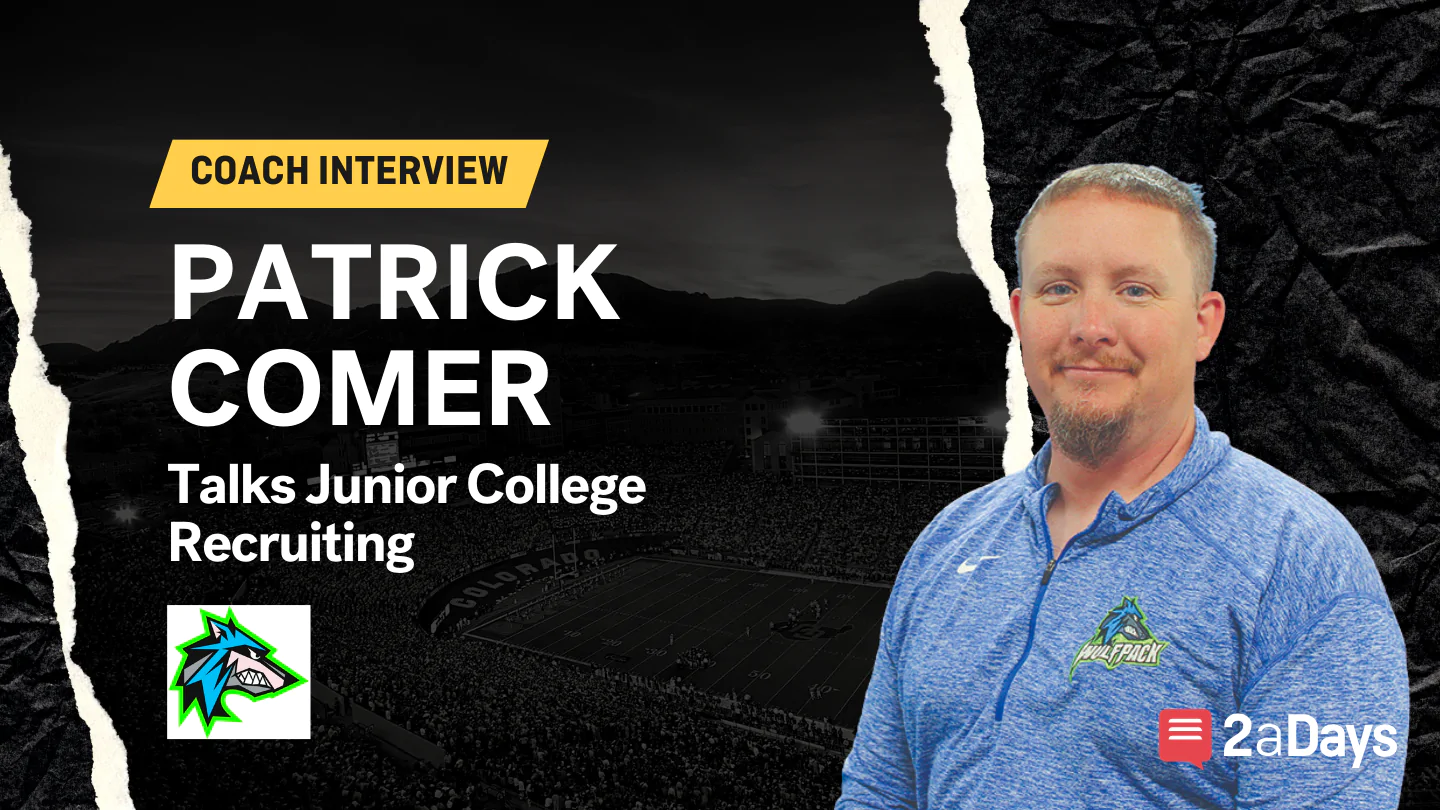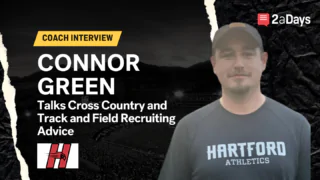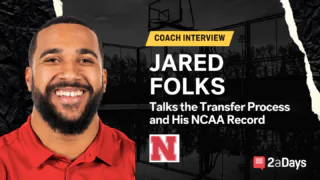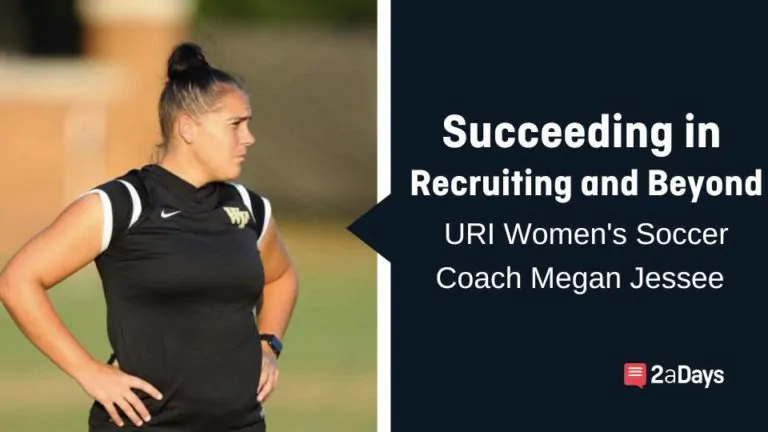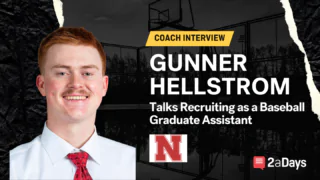Patrick Comer is the head men's and women's cross country coach at Westmoreland County Community College. The junior college coach is also the director of Athletics and Recreation. In his 13 seasons of coaching, Comer has led his teams to 3 NJCAA championships and 13 conference championships, and he was also named the NJCAA Central Region Women's Coach of the Year in 2019. Today Coach Comer talked to us about junior college recruiting, life as a college cross country athlete, and how to be a successful junior college athlete.
1. Tell our readers about yourself. How would you describe your coaching style?
I have been the men's and women's cross country coach here at Westmoreland for the last 13 seasons. As a coach, I feel that quality miles are better than the quantity of them. I treat my athletes like adults, I am not a micromanager. For me, the most rewarding thing about coaching at the college level is seeing our athletes being successful when they move on from Westmoreland. I always hope they learn a little more about life from me.
2. What are some of the most important qualities you look for in a recruit?
- Being open, talkative, and personable. When you talk to a coach, we want to hear from you, not from your parents. We want to get to know you as a person, so do not be afraid to talk and let us get to know you.
- Being a hard worker. Being a hard worker does not always mean being the first one to practice and the last one to leave. It means you try to make yourself be the best version of yourself possible. Some of the hardest workers I ever had were not my best runners. They were the student athletes who showed up every day and gave 100% at everything we did.
- Being a leader. We are always looking for student athletes who are looking to take charge. They want to lead by example to make those around them the best student athlete they can be.
3. What are your expectations for incoming players in the classroom, in the weight room, and during their races?
I want student-athletes to work just as hard in the classroom as they do at practice and in games. Almost all of our athletes will be going “pro” in something other than sports. So, I expect them to put in the same amount of effort in the classroom. I expect them to be attending all practices, as well as all their classes.
4. What does it take to be successful on your team?
- Being open-minded and hard-working. Those who listen to what we tell them and work to implement the things we tell them. Whether we are talking about running form or things in the weight room, it's always important to listen and use the knowledge from the coaching staff who have been in their shoes before.
- Time management is also a priority. Getting work done on time for classes, and being on time for practices so as to not hold everyone else up. Not interrupting practice so that everything that we need to get done for the day gets done.
- Finally, honesty, because as a college student, you are an adult and will be treated as such. We expect that same level of respect back from our student-athletes.
5. What are 3 words your players would use to describe you?
Passionate, loyal, and caring. My athletes know I love what I do, they know I always have their backs, and that I care deeply and want to see them succeed in all facets of life.
6. What are the must-do's and don'ts when being recruited?
- Make sure that you always respond to a coach's calls, texts, and emails, even if you do not plan on attending that college. You never know if things will change down the road, and you do not want to burn any bridges.
- Be honest and open with a coach, and don't just ghost them. When you make a decision, contact all the coaches who have been reaching out to you, because they have invested a lot of time coming to see you perform, sending you information, and meeting with you on campus. It's a polite thing to do so they can cross you off their recruiting list and know that they should move on.
- Don't be afraid to reach out to a coach. There are thousands of recruitable athletes, and if you want to be recruited, sometimes you need to be the go-getter and start the conversation.
7. What can a player expect when they enter college?
Coming in as a freshman, we see some students surprised by the practice workload. For some in the beginning it is more work than they ever saw in high school, and for others, it's just another day of practice depending on the high school program they came up through. There are lots of perks for being a part of the team as well. Coming in as a freshman on the first day, you already know people because of summer workouts and cross country camp, you already know some of the students in your classes because they are your teammates. And of course, the perk of all the free gear. Backpacks, hoodies, shirts, raincoats, sweatpants, you definitely get your money's worth in gear as a member of our team, and of course, you get to keep it all at the end of the season.
8. What platform(s) do you use to discover or recruit athletes?
We do most of our recruiting through social media. We have tried things such as NCSA and other recruiting sites, but 60% of our recruiting starts through Instagram. Prospective student-athletes get a chance to see the things that we post, and that they may find interesting. Direct messaging is the way to go. Students always have their phones in their hands and social media open. They will answer a DM before they answer an email. Emailing students seems to be a dead end sometimes, but they are always checking their social media apps all day long.
9. Is there anything you'd like to share that we have not discussed yet?
A lot of students going through the recruiting process of course have the stigma about going to a junior college, and it's simply not true. Our professors teach here at Westmoreland, and they teach the same classes at four-year schools in the area. The same class at the four-year school just costs way more for the same class and with the same teacher.
I always tell recruits, if you were offered a pair of shoes for $100 by someone, and then someone else offered you the same shoes for $40, which one would you buy? Recruits need to think about their college credits the same way. English 101 is the same here as it is at a four-year school, just cheaper. I was a junior college student before transferring to a four-year institution, and I came out way ahead of a lot of my friends. Even though I went to Westmoreland first, my degree still says The University of Pittsburgh on it. Plus, the amount of money, I saved by going to a junior college first, I was able to have all my student loans paid off by the time I was 26 years old. I have friends who are now in their 40s and still paying for four years at a big school.
Money is not the only thing recruits need to be looking at when considering a junior college. Playing time is another big factor. At a junior college, you're competing against other 18 to 20-year-old students for playing time. You are not stuck behind a junior or senior for the first year or two. Plus, some colleges may have 60 students in their program, so you are just a casualty of the number. Going to a JUCO allows you to get playing time that may not be afforded to other freshmen or sophomores. When you go to transfer, you have a leg up on a lot of student-athletes because you have playing experience and a track record of success in the classroom.
There is also the fear that the competition will be subpar at a junior college. My cross-country team has been consistently ranked in the national top ten and beats a good number of four-year schools at meets we go to. So, whatever you do, do not sleep on junior colleges!
Image Credit: Westmoreland County Community College
